

The Brain on Trial - Magazine. Advances in brain science are calling into question the volition behind many criminal acts.
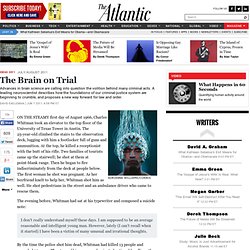
A proposal to classify happiness as a psychiatric disorder. Looking to Genes for the Secret to Happiness. Surprisingly Large Cost of Telling Small Lies. Recently, I caught up with one of our angel investors for lunch: Peter is a brilliant entrepreneur from England who has lived all over the world.
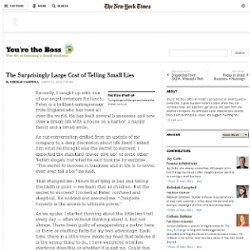
He has built several businesses and now lives a dream life with a house on a harbor, a happy family and a broad smile. Homunculism by Colin McGinn. How to Create a Mind: The Secret of Human Thought Revealed by Ray Kurzweil.
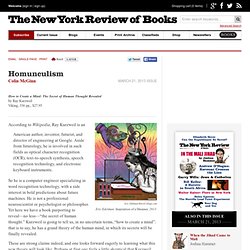
Issue 1: What Makes You So Special. This is your brain, on. Apr/May 2013 Two books seek to explain how our minds work their way through the maze of consciousness Eric Banks.
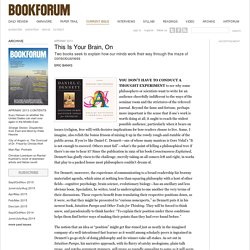
Joseph Epstein. The great American fraud that dare not speak its name, though anyone who owns a television set is aware of it, is college athletics.

Amateur though they are supposed to be, the only thing truly amateur about them is that they do not pay the (supposed) students who play them, at least not directly. The two great money-making college sports, of course, are football and basketball—money-making, that is, if the school has a successful program. I love that word “program,” a euphemism behind which lies a vast network of recruiting, excessive practice time, heavy travel during the school year, and coaches paid millions of dollars in the hope that they will, through the “program,” bring in many millions more.
The least-noted award in all of sports must be the Academic All-Americans. James (1884) What is an Emotion? An internet resource developed by Christopher D.
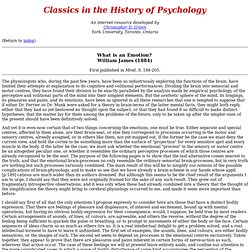
Green York University, Toronto, Ontario. On Fear by Mary Ruefle. Beyond Blame. In an article published shortly before his death, the political scientist James Q.
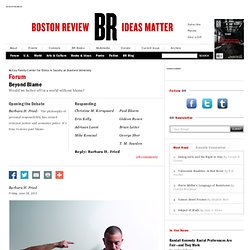
Wilson took on the large question of free will and moral responsibility: Does the fact that biology determines more of our thinking and conduct than we had previously imagined undermine the notion of free will? And does this possibility in turn undermine, if not entirely destroy, our ability to hold people accountable for their actions? In Praise of Idleness By Bertrand Russell. Like most of my generation, I was brought up on the saying: 'Satan finds some mischief for idle hands to do.' Being a highly virtuous child, I believed all that I was told, and acquired a conscience which has kept me working hard down to the present moment.
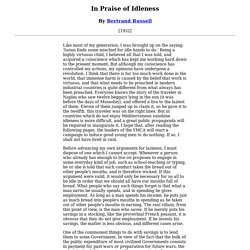
But although my conscience has controlled my actions, my opinions have undergone a revolution. I think that there is far too much work done in the world, that immense harm is caused by the belief that work is virtuous, and that what needs to be preached in modern industrial countries is quite different from what always has been preached. Depression and the Limits of Psychiatry. The Stone is a forum for contemporary philosophers and other thinkers on issues both timely and timeless.

I’ve recently been following the controversies about revisions to the psychiatric definition of depression. I’ve also been teaching a graduate seminar on Michel Foucault, beginning with a reading of his “History of Madness.” This massive volume tries to discover the origins of modern psychiatric practice and raises questions about its meaning and validity. A World Where We Are All Autistic. May 7, 2013 — On a memorable spring evening in 2002, the philosopher Peter Singer welcomed disability rights advocate Harriet McBryde Johnson to speak at Princeton University.
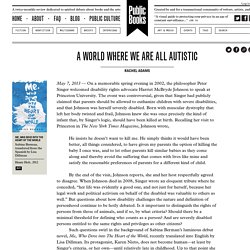
The event was controversial, given that Singer had publicly claimed that parents should be allowed to euthanize children with severe disabilities, and that Johnson was herself severely disabled. Born with muscular dystrophy that left her body twisted and frail, Johnson knew she was once precisely the kind of infant that, by Singer’s logic, should have been killed at birth. Anthrozoology. Anthrozoology (also known as human–non-human-animal studies, or HAS) is the study of interaction between humans and other animals. It is a modern interdisciplinary and burgeoning field that overlaps with a number of other disciplines, including anthropology, ethology, medicine, psychology, veterinary medicine and zoology. A major focus of anthrozoologic research is the quantifying of the positive effects of human-animal relationships on either party and the study of their interactions.[1] It includes scholars from a diverse range of fields, including anthropology, sociology, biology, history and philosophy.[2][3][4] Anthrozoology scholars recognize the lack of scholarly attention given to non-human animals, and to the relationships between human and non-human animals, especially in the light of the magnitude of animal representations, symbols, stories and their actual physical presence in human societies.
Areas of study[edit] Growth of the field[edit] See also[edit] References[edit] One of Us. Essays These are stimulating times for anyone interested in questions of animal consciousness. Dogs and Human Survival: Do the Eyes Have It? Dog domestication may have helped humans thrive while Neandertals declined Pat Shipman We all know the adage that dogs are man’s best friend. And we’ve all heard heartwarming stories about dogs who save their owners—waking them during a fire or summoning help after an accident.
Anyone who has ever loved a dog knows the amazing, almost inexpressible warmth of a dog’s companionship and devotion. Dogs spot the dog. Public release date: 14-Feb-2013 [ Print | E-mail Share ] [ Close Window ] Contact: Joan Robinsonjoan.robinson@springer.com 49-622-148-78130Springer Dogs pick out faces of other dogs, irrespective of breeds, among human and other domestic and wild animal faces and can group them into a category of their own. They do that using visual cues alone, according to new research by Dr.
Dog's Best Friend. I Met The World's Smartest Dog. Are Pigs as Smart as Dogs and Does It Really Matter? How animals perceive time: Slo-mo mojo. Our fellow creatures - bookforum.com / omnivore. Follow us omnivore Our fellow creatures Jun 26 2013 9:00AM. The Brains of the Animal Kingdom. Washington State Magazine. Do Elephants Have Souls? Anthrozoology Institute. The Epidemic of Mental Illness: Why? by Marcia Angell. Beyond the Brain by Tanya Marie Luhrmann. By the time I met her, Susan was a success story. She was a student at the local community college. Is Everyone on the Autism Spectrum? Persistent cannabis users show neuropsychological decline from childhood to midlife.
Why Do You Want to Be Famous? Babies Bamboozled by Numbers. Synesthesia: Some People Really Can Taste The Rainbow : The Salt. IQ scores reflect motivation as well as 'intelligence' How Your Birth Order Can Influence Who You Are. Awakening - Joshua Lang. "As a Man Is, So He Sees" How Our Brains Make Memories. Daniel Kahneman: The riddle of experience vs. memory. How consciousness works – Michael Graziano. The Neuroscience of Your Brain on Fiction. Adam Gopnik: The New Neuro-Skeptics. Is it rational to have children. Why Parents Hate Parenting. The Barren Wombs of Smart Women. Evolution and Existentialism, an Intellectual Odd Couple - The Chronicle Review.
Robert Sapolsky discusses physiological effects of stress. Associations between social behaviour an... [Gen Comp Endocrinol. 2013. On Loneliness: Art, Life, etc. Study Predicts Political Beliefs With 83 Percent Accuracy. Paracetamol Can Soften Our Moral Reactions. The Essential Psychopathology Of Creativity. Common Behavioral Biases. Scope Insensitivity. Paul Bloom: The Case Against Empathy. The Principle of the Hiding Hand. ΒβC's βrain Story - Complete Series. Brain Science - IAE-Pedia. Could A Dopamine Gene Be the Answer to a Longer Life? Researcher: Dopamine Not About Pleasure (Anymore)